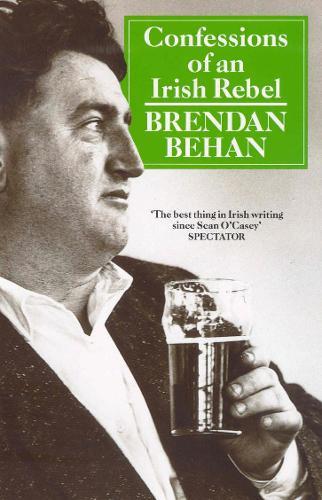Overview
A posthumously published autobiography from the famous, even infamous, Irish playwright and author of Borstal Boy. Continuing the longstanding tradition of political Irish literature, propagated by James Joyce and Sean O'Casey, this is the true story of life in the IRA. The immigration man read my deportation order, looked at it and handed it back to me. 'Are you Irish?' he asked me. 'No' I said 'as a matter of fact, I'm Yemenite Arab.' Two detectives came forward who were evidently there to meet me. 'Apparently he is Brendan Behan,' they said. The immigration officer shook my hand and his hard face softened. 'Cead mile failte romhat abhaile.' (A hundred thousand welcomes home to you.) I could not answer. There are no words and it would be impertinence to try. I walked down the gangway. I was free. First published after Brendan Behan's tragic death, Confessions of an Irish Rebel picks up where Borstal Boy left off. Not only is it the last instalment of a unique and unorthodox autobiography, but of a unique and unorthodox life that was as touched with genius as it was with doom.
Full Product Details
Author: Brendan Behan
Publisher: Cornerstone
Imprint: Arrow Books Ltd
Edition: New edition
Dimensions:
Width: 12.90cm
, Height: 1.70cm
, Length: 19.60cm
Weight: 0.194kg
ISBN: 9780099365006
ISBN 10: 0099365006
Pages: 272
Publication Date: 05 April 1990
Audience:
General/trade
,
General
Format: Paperback
Publisher's Status: Active
Availability: To order

Stock availability from the supplier is unknown. We will order it for you and ship this item to you once it is received by us.
Reviews
The best thing in Irish writing since Sean O'Casey * Spectator *
The best thing in Irish writing since Sean O'Casey Spectator
The best thing in Irish writing since Sean O'Casey * Spectator *
Foul language lyrically intact, this tape-recorded autobiography and last testament covers Behan from his release from Borstal prison during WWII through his marriage in 1955. And if these are the confessions of an Irish rebel, they are indeed confessions, he remarks, and proceeds with a classic of self-revelation. Abject, singing, bitter, jailed or drunken, he is mercilessly honest, insistently ribald, compassionate of others, very, very wise and belching with spirit. A member of the IRA, his cry was Up the Republic! We defy you, and to hell with the British Empire! That he killed some men, he is sad. At fifteen, he was given a seven-year sentence, served four. Again back in jail for political activity, he was given 14 years, then released after a few years under a general amnesty. (The second sentence provided him with the story for his play The Quare Fellow.) Soon he was helping a fellow IRA man escape prison in England, from which Behan had been expelled. The man escaped back to Ireland, but Behan was captured and given four months for being in England with false papers. When released, he was 24 wild years old. He began writing for money. In Paris he met Sartre, Camus and Beckett, took a turn at pimping, wrote pornography. The story ends with the production of his first play... A profanely joyous book and a welcome reappearance of the Borstal Boy. (Kirkus Reviews)
Author Information
Brendan Behan was born in Dublin in 1923. A member of the IRA, he was sentenced to three years in Borstal in 1939 and a further fourteen years in 1942. He became a dominant literary figure almost overnight with the 1956 production of his play The Quare Fellow, based on his prison experiences. This recognition was reinforced by the success of Borstal Boy and his second play, The Hostage. Brendan Behan described his recreations as 'drinking, talking, and swimming' but no factual description could do justice to his flamboyant, larger-than-life character. Generally regarded as irreverent and unpredictable if not actually dangerous, there was nonetheless no publicity which ever obscured his marked talents or his great understanding of human nature. A man whose contemporaries include Flann O'Brien, Patrick Kavanagh and Anthony Cronin, Behan was a key part of Ireland's great modern literary tradition. Brendan Behan died in 1964.



